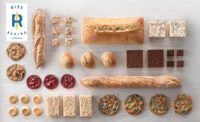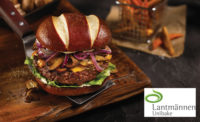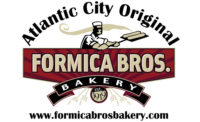Passion underpins the dedication to invest the time and resources required to bake bread with unmistakable Old World artisan flavor, appearance and texture. And strong business sense leads such bakers to judiciously capitalize on the technological tools available to help bring those truly artisan breads to a wide customer base without compromising craftsmanship.
Such a merger of art and science is the way of life at Hudson Bread, based in North Bergen, NJ, primarily supplying restaurants and other foodservice institutions throughout Connecticut, New Jersey, New York and Pennsylvania.

Strong roots
Mariusz “MK” Kolodziej, president, gained initial exposure to the world of artisan baking via his father’s bakery business in Poland. Years later in the U.S., he followed his father’s path and opened his own bakery, along the Hudson River near New York City, in 1994.
“The original location was in Jersey City,” says Kolodziej. “We operated there for about five years and then moved to West New York.”
The bakery’s customer base continued to grow, and Hudson Bread moved into its current space in 2006. A retail bakery and café opened adjacent to the wholesale bakery in 2008, still serving customers today, selling its signature bread, buns and rolls and offering a menu of sandwiches, salads and smoothies. A second café location in Secaucus, NJ was added in 2015, and a third café will open soon at a nearby Rutgers University campus. The Hudson Bread Café business is run by Kolodziej’s wife, Katarzyna.
“We started the café because people were coming to the loading dock to try to buy our bread,” says Kolodziej. “It’s also a good marketing tool—and an educational tool for us to find out what customers are looking for.”
When Hudson Bread first moved to its North Bergen location, it occupied 60,000 square feet. But expansion has continued, and the bakery recently added more space by growing vertically, adding 6,000 square feet on a newly expanded second level, primarily dedicated to ingredient batching and storage—and this approach of maximizing headspace will see continued attention. “We have projected doubling our business within the same footprint utilizing all the space above us,” says Kolodziej.
The bakery is also now SQF-audited, scoring a 95 percent this past year. “We work every day to improve our processing in the bakery,” says Kolodziej. The bakery is moving forward with Non-GMO Certified Project verification, which should be in place for rollout in 2018.
Hudson Bread is planning to add capabilities for distributing frozen product, which would catalyze a push for extending distribution along the East Coast, as well as into international locations.
Such strategic growth and improvement is necessary in order to remain competitive in today’s bakery market.
“Customers are more cost-conscious than before, and quality is not always priority No. 1,” says Kolodziej. “With the advent of large buying groups, pricing is so close—there is very little margin to work with—that sometimes quality suffers.” But instead of cutting quality to remain cost-competitive, Hudson Bread has streamlined operations in order to stay in the game. “We have maintained all the formulations and sizes and have internally worked on efficiencies to continue to offer the same quality at these pricing tiers.”
The U.S. and international market for expertly crafted artisan bread products continues to expand, and Hudson Bread is well positioned to meet this demand.

Artisan ideals
Raymond Million, vice president of operations, likens the craft of baking bread at Hudson Bread to other artisanal products like fine cheese and wine—all aspire to excellence through careful control of quality inputs and the manipulation of time to achieve characteristic, defining flavors.
“Time and temperature controls are the most-important aspects in anything that has to do with dough fermentation,” says Million. “The long, cool proofing process helps develop a fuller spectrum of flavors.”
Hudson Bread has long capitalized on strategic investments in operational efficiencies in order to drive its business forward, offering the volume its customer base seeks. “We utilize technology, along with traditional baking techniques,” says Kolodziej.
All sourdough starters are created in-house, and every Hudson Bread product includes a preferment, typically naturally yeasted, liquid sours.
Hudson Bread climate-controls the production floor for an ambient temperature of around 76 to 78°F, and controlled dough temperatures in the range of 74 to 75°F during the make-up of the products.
The lines are set up for gentle, stress-free dough-handling to develop peak artisan quality in the finished product. “We run six lines dedicated to specific products,” says Kolodziej. “The lines are redundant in case of emergency or anticipated overruns with production. They are automatic, from makeup to panning.”
Those six lines can accommodate dozens of different types of breads. “We have 20 mother doughs that produce up to 200 different products, currently,” says Million. In the past, that number has been higher, but Hudson Bread made a corporate decision to focus on core products for quality and consistency for its customers—and production efficiency.
“We concentrate on the items that we do well, that taste good and that are useful,” says Kolodziej.
The Hudson Bread product range encompasses dinner rolls, sandwich rolls, retail loaves, boules, free-form breads, Pullman loaves, focaccia, flatbreads, breadsticks, crisps and lavash made with a variety of dough types, such as French, ciabatta, 7-grain, whole-grain, Italian, semolina, fruit and nut, and brioche.
Despite adherence to a core lineup, experimentation continues. A recent project centered on creating spouted-grain bread—an option Million saw as a possible option for some people who have experienced intolerance issues, since sprouted grains are easier to digest.
Operational enhancements
Hudson Bread utilizes an automated ingredient-batching system that makes short work of ramping-up production runs—and the system was recently updated with additional capabilities. “We just purchased an addition to our ingredient-handling equipment from HB-Technik to incorporate liquid rye starter, which imparts a softening quality to the flour and produces a better mouthfeel and tear when eating,” says Kolodziej.
“The batching system increases efficiency and output compared to the old style of hand-scaling ingredients,” says Million. “The delivery system allows us to discharge up to 90 batches in a nine-hour shift.”
The bakery also added liquid ice production to the HB ingredient system. This technology allows water to be chilled below 32°F, in the range of 24 to 25°F, to help control the dough temperature without conventional ice. Use of liquid ice in the summer months helps Hudson Bread maintain the right temperature range for its dough.
This computerized batching system is integral to Hudson Bread’s productivity—a fact that was clearly evident one day a few years back when the system went down. “What it took us to produce in a normal day, about nine hours, took 18 hours without the system,” says Million. “So there’s where the aspect of technology really comes into play.”
Kolodziej likes to keep his bread lines current. “Our equipment purchases are usually within five years, and we always replace the line with the newer version,” he says. “We just purchased a new Menes line from Koenig to handle all our soft doughs and French baguette production.”
Hudson Bread has worked with MIWE to supply its new range of ovens and related oven technology, like automated loaders.
The highly efficient system Hudson Bread has established, working with its equipment supply-chain partners, has translated into an average of less than 2 percent waste for the operation.

Naturally cold proofed
The bakery also worked with MIWE to create its signature fermentation room, where all of the bakery’s products proof after running on the line, to hold before baking.
This step in the process is so vital to the quality of the products that Hudson Bread includes “Naturally Cold Proofed” as part of its company logo.
Million notes that the room’s temperature is kept at about 42 to 44°F. “We keep it alive,” he says. “It’s spongy, and it’s moving. We hold it this way until it’s time to bake. We’re not concerned about putting it in a proofer. Basically, it comes out, sits on the floor a few minutes, loses a little temperature, and goes right into the oven.”
All products hold in the fermentation room for 12–24 hours.
“This is fermentation held slow and steady, just like making wine, naturally allowing the dough to rise to the right size,” says Million. “You’re not speeding anything. You’re not forcing any kind of temperature-driven growth. It’s all in the balance.”
The bakery maintains roughly 10 percent overage of core products in its fermentation room in order to quickly fulfill last-minute orders for customers.
Next steps
Hudson Bread has several impending projects that will enhance its operational efficiency and capabilities.
“The bakery will receive a new in-line flow wrapper,” says Kolodziej. This will facilitate packaging bread and rolls for the home delivery and e-commerce aspects of the business, potentially an area of growth for Hudson Bread.
Shipping frozen product is another market capability that holds significant potential for Hudson Bread. “We’re strategically planning how to help the sales force best utilize its territory—how to broaden the territory, how to reach greater distances,” says Million. And while many bakeries are moving into frozen breads these days, Hudson Bread seeks to bring differentiation to the available product range.
“Frozen is a concept that a lot of bakeries over the years have turned to,” says Million. “One of the things that we’ve noticed is that whenever someone produces frozen, they start out making breads with adequate quality, and then eventually it becomes very tasteless—there’s nothing to it, the flavor disappears. Our purpose in making bread is to offer something more, to bring flavor to the market through our passion and dedication to truly artisan bread. We want to be the bakery who puts a really great bread out there with a clean label.”
Moving into frozen products also helps maintain the bakery’s reputation for quality. Customers who are located farther away from the bakery might, for instance, receive a delivery of products that will supply them for three days. By the second or third day, the quality of the bread begins to drop off. Shipping frozen products that the customer can then thaw and use as needed offers improvements on this freshness value proposition.
Another aspect of sustainability within Hudson Bread is the addition of an air-exchange system that captures the energy produced from within the bakery to strategically distribute warm air across the bakery during cooler months of the year, as well as expanded capabilities for specific bakery necessities, like heating water for cleaning stations. This maximizes resources and reduces the bakery’s carbon footprint.
Hudson Bread has already made some steps along these lines. “The energy from our heaters for the thermal oil is used to heat water within the bakery, and to heat the oven room in the winter,” says Kolodziej.
Giving back to the future
The aforementioned Hudson Bread Café planned for the Rutgers campus is only one aspect of a multifaceted relationship with the university.
Hudson Bread also supplies Rutgers with its bread, buns and rolls for its university foodservice program—and provides support for scholastic development. Kolodziej and his charitable MK Foundation organized a competition within the Rutgers Business School, which tasked students to formulate marketing and branding strategies for Hudson Bread. The four best teams received financial awards, and an opportunity for select team members to work at Hudson bread immediately after finishing their studies. The first competition took place in spring 2017, and another one is planned for this November.
The MK Foundation also provided two Rutgers students who are part-time Hudson Bread employees with full scholarships. The foundation will continue providing scholarships for exceptional Rutgers Business School students, based on academic merit, throughout the next five years.
This provides practical experience for the students—and brings fresh ideas to the bakery’s leadership. “Those students eventually are going to be making decisions about what to buy, and they react to everything slightly different than we do. We have to find out where the market is going,” says Kolodziej. “Last time, we brought in 24 students for a project, and those students come up with a lot of different ideas—and we listen.”
At a time when baking faces regular challenges with workforce development, Hudson Bread has found a way to foster innovation while incubating the talent of the next generation of leaders—a win-win proposition that will drive business forward.












